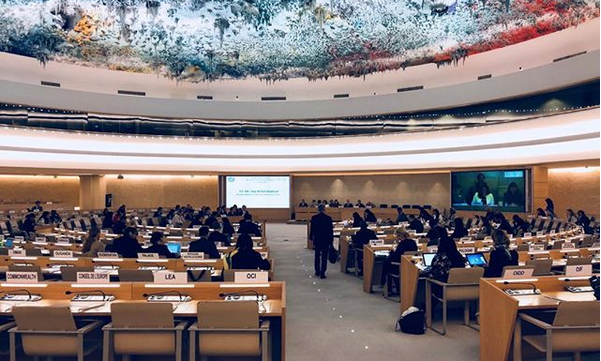Canada Urged to Ensure Better Access to Food: UN Human Rights Review

Photo credit: UN Human Rights Council
Written by Rhonda Ferguson
How well is Canada meeting its international human rights obligations? On May 11, it was our turn to be reviewed by the United Nations, with Canada’s third Universal Periodic Review (UPR). While we were congratulated on some advancement toward realizing the objectives set out in key human rights instruments, we also received 275 recommendations, including five that are closely linked with food security and the right to food.
Public Engagement Meeting Hosted by the Department of Canadian Heritage
The Department of Canadian Heritage hosted the first follow-up meeting to this review in Ottawa on June 6. Thirty seven non-governmental organizations, Indigenous Peoples groups, and other organizations like the RCMP, participated. However, it was apparent that some organizations were missing because they lacked resources or adequate lead time. There was clear support in the room for greater recognition of issues related to socio-economic rights, including the right to food, by our government. We were invited to suggest which recommendations the government should accept and prioritize.
What is the Universal Periodic Review?The UPR functions as a sort of peer review process among countries. A working group evaluates the country under review, although all other countries are welcome to join in with comments. While the process is deeply political, it is also a forum that boasts participation from all 193 UN member states. It is an opportunity for focused dialogue between the country under review and others, as well as civil society. Countries can accept or ‘note’ recommendations, with the latter being, essentially, a way for states to politely decline to take action on a particular matter. When a recommendation is accepted, this signals a commitment by a government to take some sort of action. |
Disparities in Health, Food Security and More Between Indigenous Peoples and Settlers
A significant portion of the recommendations to Canada from other countries concern the disparities in health, education, employment, and access to services between Indigenous Peoples and settlers. Others emphasized the need for Canada to ratify the Optional Protocol to the International Covenant on Economic, Social and Cultural Rights (OP-ICESCR) because this would enable Canadians to file official complaints regarding socio-economic rights directly to the treaty body, once domestic remedies had been exhausted. It would be an avenue to access justice for violations of the right to food for Canada.
We Urge Canada to Recognize the Right to Food for All
The task for Canada now is to decide which recommendations to formally accept at the final stage of the review process in Geneva this August. Food Secure Canada has encouraged the government to Ensure the Human Right to Food through a Food Policy for Canada and policies and programmes that support food security for all people in Canada. As such, we especially support the acceptance of the following five recommendations:
- Intensify efforts to provide equitable access to health education, social services, quality water and food security for [I]ndigenous people (recommended by Trinidad and Tobago)
- Implement effective measures to reduce the high levels of poverty, food insecurity of the [I]ndigenous peoples and to ensure better access for them to health care, education, adequate housing and other basic necessities (India)
- Interpret the Charter of Rights and Freedoms confirming the interdependence and indivisibility of all human rights with a view to ensuring access to food, health and adequate housing for all those living in the country (Uruguay)
- Ensure the justiciability of economic, social and cultural rights (South Africa)
- Ensure that its Poverty Reduction Strategy includes a targeted approach to addressing socio- economic disparities and systemic discrimination experienced by African Canadians and [I]ndigenous peoples and a federal disaggregated data collection programme (Trinidad and Tobago)
| Join the conversation on the Right to Food in Canada at Food Secure Canada’s 2018 National Assembly! |
- Log in to post comments

